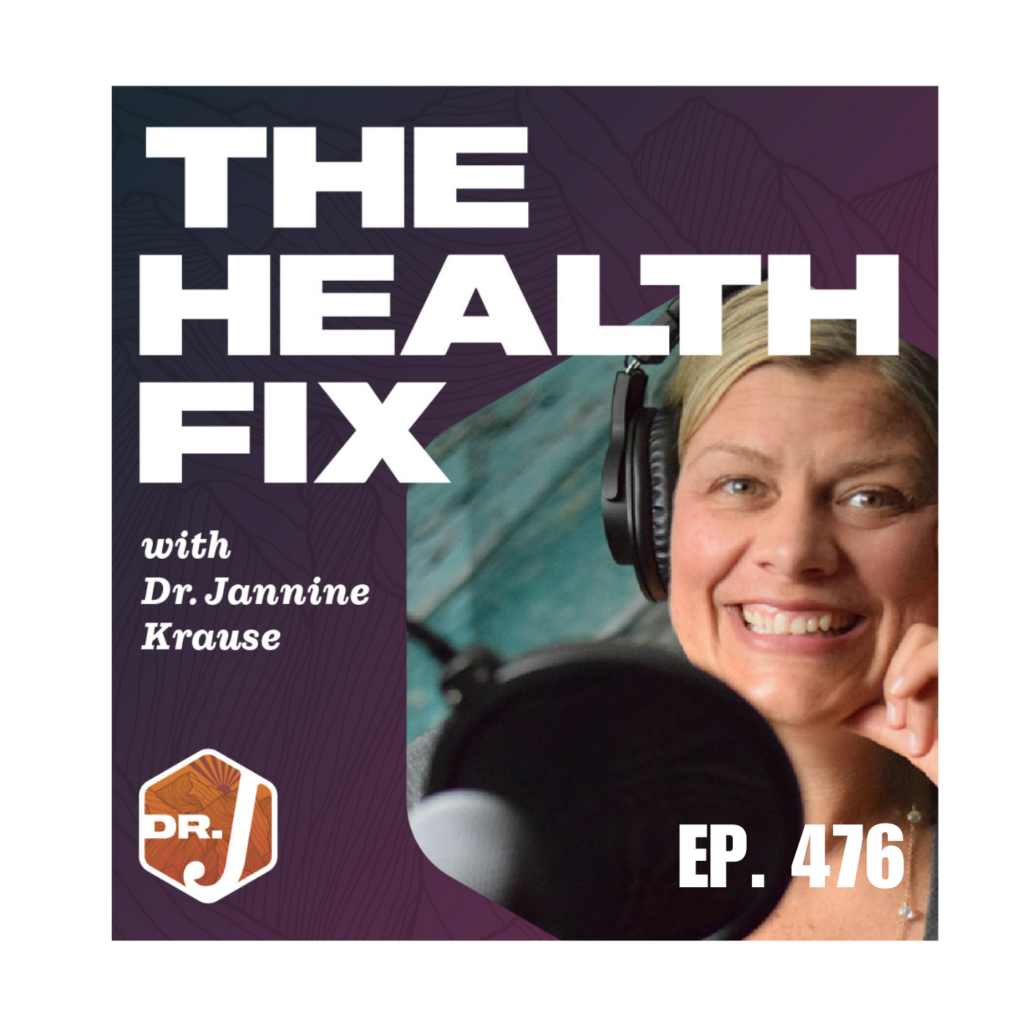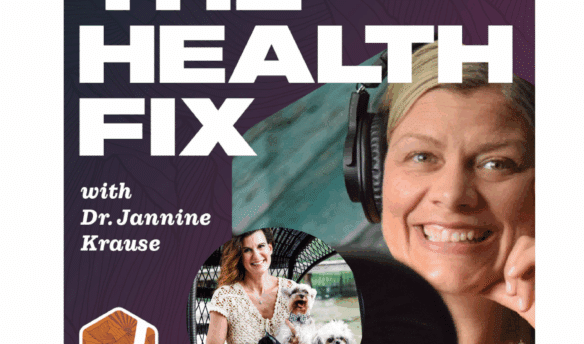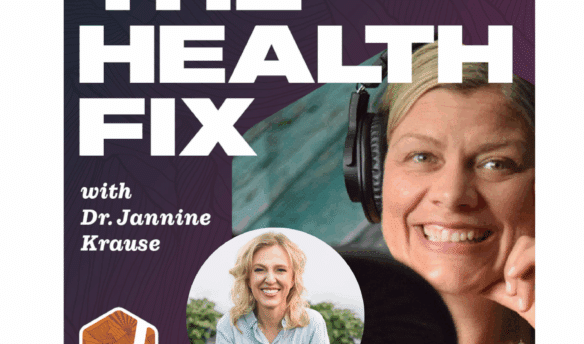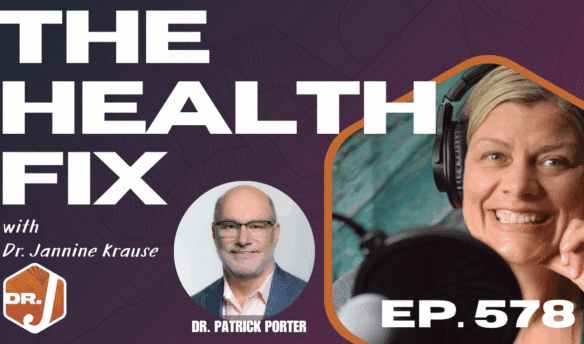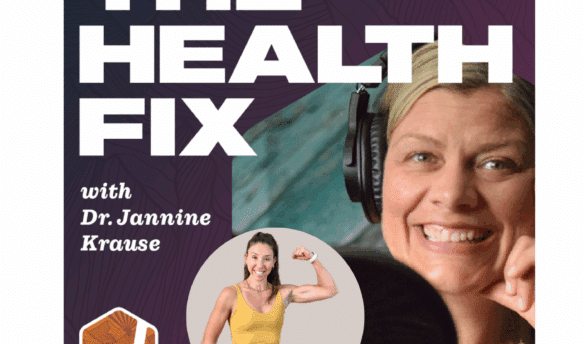Waking up at 2-4a every night and not being able to get back to sleep is frustrating. What’s keeping you from sleeping? While there’s routines, habits and throught process there are some metabolic reasons you’re not sleeping. In this episode of The Health Fix Podcast, I, Dr. Jannine Krause dive into the metabolic and hormonal reasons for waking up between 2-4 am.
Dr. Krause’s Protocols
Instructions Included
Traveling soon? Looking to detox or reset your gut? Try one of Dr. Krause’s Fullscript plans.
What You’ll Learn In This Episode:
- Liver and Lung connection to early morning wake ups
- How magnesium messes with your blood sugar to keep you awake
- The connection between potassium deficiencies, waking up to pee and cramps
- Where stress interferes with your sleep metabolism and hormone production
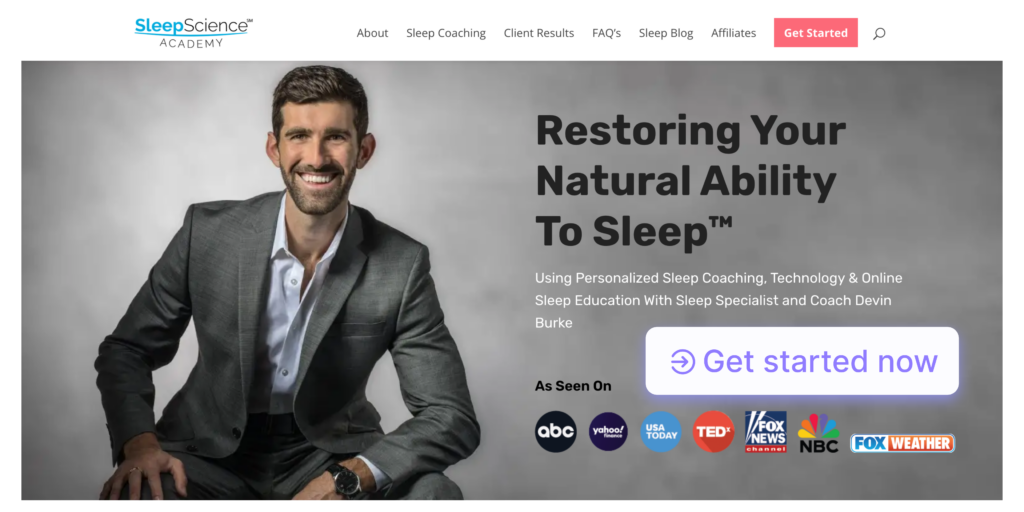
Use code DRJ10 for 10% off
Resources From The Show:
- Chinese Medicine Organ Clock
- Methylation Panel by Genova Diagnostics
- The DUTCH Test for evaluating hormones
- Home sleep studies – Snap Diagnostics
- Comprehensive Metabolic Panel for electrolytes (potassium), red blood cell magnesium, glucose, carbon dioxide levels
Our Partners
Podcast Transcript
TAGS: Alternative Medicine, Chinese Medicine, Natural Medicine, Holistic Medicine,
3:58 – Home sleep study
4:28 – Blood sugar at night and eating in the middle of the night
6:55 – Magnesium deficiencies and sleeping through the night
9:58 – Methylation
14:32 – Cortisol and DHEA
17:47 – 5-HTP
20:14 – What could be waking you up between 2-4 am
[Intro] Welcome to The Health Fix Podcast, where health junkies get their weekly
fix of tips, tools, and techniques to have limitless energy, sharp minds, and fit
physiques for life.
Hey health junkies, on this episode of the HealthFix Podcast, you get me, Dr.
Jannine Krause, talking about why we wake up between 2 to 4 a.m. and what you can do
about it. We’re going to be talking about how you’re liver and lung mass with your
wake up. So we’re going to talk about blood sugar, metabolism, cortisol, potassium, magnesium,
and last but not least, your progesterone and estrogen levels and how they mess with your
sleep. So let’s dive in and get started. So one of the most fascinating things to me
about sleep is that we get so much done while we’re sleeping. We’re working on all kinds
of things like repair or working on detox. How cool is that? So sometimes those things
wake us up, whether we know it or not. And in Chinese medicine, there’s a clock, like
a body clock, of what’s happening at given times during the day. And coincidentally enough
between the two to four AM time frame, we have two organs that are really important for detox
metabolism and pH balance in the body. So between 1 and 3 a.m. This is when our liver is really active.
It’s liver qi time as we are told in our Chinese medicine training. And between 3 and 5 a.m.
This is the time of the lungs. And your lungs you might be thinking like, okay, I get the liver.
I know that’s metabolism. Maybe I’ve had a couple glasses of wine one night and woke up between
somewhere between one and three and then like, oh, I feel crappy. Well,
that was your liver at work. But the lungs, like, how do the lungs tie in here?
Well, the lungs are very interesting because you use your lungs to balance
your pH of your blood. Crazy, right?
So depending on breathing fast or breathing slow,
you have different levels of carbon dioxide within your blood.
And you would think that you don’t want much in terms of carbon dioxide in the blood,
but in reality, the more you have, the more basic your blood is.
Now, don’t misunderstand me that yes, we keep a very tight balance between our blood levels.
So your blood page really is 7.35 to 7.45.
I just fact checked myself for you just to make sure that my brain had not forgotten what’s going on there.
Now breathing is in charge, right, of how you keep that tight 7.35 to 7.45 pH of your blood.
But interestingly enough, your carbon dioxide levels that build up in your blood,
we can look at those with the comprehensive metabolic panel.
And I can tell if someone is breathing well or over breathing, what the heck does that mean?
You’ll have a low carbon dioxide level in your blood if you over breathe,
meaning you’re hyperventilating.
So your blood’s gonna tend towards being on the more acidic side of that 7.35 to 7.45 range.
Now, if you breathe longer and hold longer, exhales, you’ll have a tendency to have more
carbon dioxide in your blood, which will keep you more basic, which is less inflammatory.
This is a good thing.
So where am I going with this?
Really between 3 and 5 a.m. if we’re breathing funny while sleeping, meaning hyperventilating,
We may have some pH changes that wake us up.
So folks will sleep apnea, folks who snore.
There could be some very interesting things going on with the pH of your blood overnight
and that’s regular to your brain that, oh, something’s off.
So a lot of times in my practice, if I’m seeing a two to four a.m. wake up and we’ve tried
all the other things and nothing’s working, sometimes I’ll go, have you get home sleep
study?
Maybe worth it.
And this day and age, you can do home sleep studies very easily.
Docs use a company called Snap, SNAP Diagnostics, you can get everything delivered to your home.
Super easy PC. Something to think about. Now, let’s move on from the liver and lung because those two
are there. There’s something to think about. Let’s talk about blood sugar and magnesium for a second.
Now, a lot of folks are aware that blood sugar can have impact throughout the day for energy levels,
But I think we’re not quite explaining how blood sugar imbalances during the day can lead to issues overnight.
One of the most common things, and one of the like the hallmark signs of imbalance blood sugar,
is someone needing to eat before bed to make sure that they can sleep through the night,
or we can up in the middle of the night needing to go eat.
This is a real deal thing. A lot of people are embarrassed to talk about it.
And so if this is happening to you, this is, listen up.
So what’s happening is blood sugar is on a roller coaster up and down throughout the day.
There may be some stress involved in inducing this because I’ve also seen this happen in folks
who do not eat enough protein but don’t eat a lot of carbs either.
I also see this in folks that do not eat consistently.
That’s a thing.
And so I’ve also, I have to mention this, this is something because a lot of people are doing fasting.
I’ve also seen this in folks who fast to have a lot of stress because you cannot eat any food.
You could be stressed, your cortisol goes up and guess what?
Blood sugar goes with it.
So let me paint the picture.
If you start your day off without a lot of protein, right?
You grab a banana, you’re on the go, you get a, you know, or maybe you get a scone and a coffee
at Starbucks, whatever it may be.
And you get started through your day, get some stress when you get to work,
And then maybe by two o’clock you’re like, “Oh man, I didn’t eat all day.”
Then you decide to grab a salad with some chicken, which is totally healthy, but now we have no
carbon there and you’ve already tanked the carb. And so now the body’s trying to figure out how
it’s going to get you to have a snack at like three o’clock when the candy bowl over at the office.
Seems to be a thing. Someone’s always got the candy bowl. That becomes really attractive to you.
So then you go over and you get the candy, now you spunk the blood sugar, and then it’s slowly
on a decline, then you get home and you’re like, “Man, I do not feel like making dinner.
I’m going to do popcorn and wine for dinner. That’s what’s happening.”
Well, blood sugar back up. And then it’s got to come back down at some point.
When does it come back down in the middle of the night? And that’s when you get triggered
to go eat food. Now, I might have gave a little bit of an extreme example, but that’s something
that can happen. And the other thing that’s really common and probably not talked about as much
either is magnesium deficiencies in sleeping through the night. Well, let’s say in sleeping
through the night connected to blood sugar. A lot of people are aware that if they have magnesium
they’re going to sleep better, but they’re not necessarily connected to the blood sugar component
of it. Magnesium is used by the body to bring carbohydrates into the cells from metabolism to
make energy. If you don’t have enough magnesium in the body, you will struggle with insulin resistance,
higher blood sugar, things of that nature. So a lot of folks are thinking about magnesium for
laxane muscles, helping sleep through the night, but they’re not really connecting it that if
you had more protein consistently throughout the day, say every three to five hours between
like breakfast, lunch, and dinner, you might do better with sleep and not need as much magnesium
to help you to sleep. Like you could take it on a lower level, but you might not need it as much.
Something to think about. Just something to think about. Now I’m asked all the time, what’s the best
magnesium for sleep? What’s the dosage? Dose is very. Magnesium citrate will help you poop
and sleep, but you got to be careful there in terms of dosage. Some people will have a good bowel
movement the next morning on 320-350 milligrams, whereas some folks are good at like 120-150.
Magnesium glicinate. Other good magnesium. I like to call it magnesium G for good. It’s
it’s not gonna have you magnesium C
for going to the bathroom for up.
I tried to think of those ones
in terms of those memory tools.
Now, for some people, magnesium glycine
can also push the bowels too.
So if you are sensitive in your gut to magnesium,
magnesium, malate and magnesium threonate
are the ones you’re wanting to think about
for magnesium deficiencies.
Those dosages are higher,
they’re about 500 to 1000 milligrams
for magnesium, malate and magnesium threonate.
Now, magnesium threonate has a great side of benefit.
It has been found to be good for the brain too.
So I’ve kind of been gravitating towards that one
a little bit late as of late with my mind.
So something to think about there, that’s magnesium.
Magnesium can also be quite helpful for cramps at night.
So those late cramps that can wake you up
or Charlie horses in terms of how I was
explain them as a kid.
Now B12, folate, vitamin B6,
potassium, those can also be tied in there as well,
which is why it’s key to kind of test these things
to know what’s going on.
You can easily test B12 in folate,
you can test iron levels,
you can test your potassium and electrolytes in your blood.
Just to know, are you on a low spectrum of things,
high spectrum of things?
Because sometimes if it shows normal within the parameters,
you could still be having cramps
because of a low normal level of vitamins and minerals.
So something to think about.
We have genetic mutations that can be messing with things
overnight in terms of the cells,
something called methylation.
It’s very popular now.
Everyone’s kind of awake to it.
And half the population, 50% of the population worldwide
has a methylation defect,
which is, what is a methylation?
methylation detox and in particular on a cellular level.
And it takes B12, folate, iron,
and those types of things, magnesium, other minerals,
other vitamins and amino acids to help to run these cycles.
And so it is wise to look at to methylation
to help you with cellular detox,
but also preventing cramps and other things
and optimizing sleep.
So not too many people’s talking about that,
They’re talking about methylation in terms of moods,
depression, anxiety, and also talking about
in terms of cholesterol.
So another connection there.
Now, I mentioned potassium and I mentioned cramps.
A lot of folks think like,
“Ah, I have a banana before bed, I’m gonna be good,
and maybe you may be.”
But what I’ve found over time is using cream of tartar,
which is potassium by tartar.
quarter teaspoon in water after dinner or at least two hours before bed.
And I’m finding less cramps and folks, but I’m also finding that can help with sleep.
So if you’re waking up a lot at night to go to the bathroom and you’re like, man,
I cut off my liquids at like two, three hours before bedtime.
What gives this could be one of the things.
So just a little planting a little seed that you could use cream at
tartar. You could also get a potassium by tartar trade or potassium citrate any of those types of
supplements to entrit them out as well. Now potassium is tricky. It comes with the warning
too much potassium. It can mess with heart rate. Your heart rate can speed up. You can get palpitations.
Nobody wants that. So this is why it’s wise to get your electrolytes tested in your blood and
work with someone to know what dosage to take. However, anywhere between an eighth to a quarter
teaspoon of of cream of tartar is something that I found to be generally safe for most folks.
Keep in mind this is not a substitute for medical advice here on the health fix podcast. It’s more
just what I’ve seen work and and help out folks. So trying out this trick of a quarter and if
you’re sensitive, go down to an eighth or if you’re working on kids, definitely a sixteenth to an
is, will the fairy dust there, um, works out, but keeping in mind that everyone is different.
And this could be helpful, but about for a week, if it doesn’t work within a week, then okay,
it’s not your thing. You know, sometimes even a couple nights, three nights, you’re gonna know
potassium effects show up quickly if it’s gonna work for you. So that being said, if your cream
is tartar that you normally use for biscuits is hanging around and you got some leg cramps
I’m sure you’re waking up at 9-2-P, try it out.
And see what happens.
[Advertisement] Hey, health junkies.
Having been a former Insomniac,
I know how important sleep is for your health
and daily performance.
And when you can’t sleep, the anxiety and frustration
that shows up around bedtime can be intense.
This is why I’ve partnered with Devin Burke
and his Sleep Science Academy to help you end Insomniac
and sleep issues once and for all.
How good would it feel to eliminate sleeping anxiety?
Stop waking up between 2 and 4am, like clockwork.
Feel rested when you wake up and not have to take handfuls of supplements or medications to do that.
Devin’s Sleep Science Academy is not another dial-in your sleep hygiene program. It provides you
with the support you need paired with cutting-edge sleep technology to help you understand your
sleep at a deep holistic level. Let’s face it, most people spend $500 to $3,000 a year on supplements
or meds for sleep. Not to mention, all the lost productivity and being able to enjoy life to the
fullest. Priceless. So, with their no risk money back guarantee, what do you have to lose but another
night of sleep. Head to doctor spelled out J K R A U S E N D dot com forward slash E P
four seven four to check out Devin’s sleep science Academy.
JANNINE: Now the next big one that I think a lot of folks are aware of but not necessarily sure how it
kind of plays into to form on balance is cortisol and D H E A. These are you know we know cortisol
as a stress hormone, DHEA is the precursor to cortisol. They both can mess with sleep. And
if you’re stressed out, your DHA levels are going to go up. Same thing with cortisol.
Now, because DHEA has a branch off where it goes to making testosterone, you may start to make a
little more testosterone and maybe you’ll make a little more estrogen, which can help counter
that elevation of cortisol and keep you sleeping. But sometimes our cortisol levels will out power
or outweigh, let’s say, our melatonin levels, because melatonin is what is needed to keep
us asleep.
And cortisol is what wakes us up.
And in some cases, melatonin will actually be suppressed by elevated levels of cortisol.
This happens very commonly in perimenopause and menopause, as progesterone levels decline
and as estradiol levels decline.
in particular estradiol. We need the estrogen estradiol to help us make serotonin and then
help us to make dopamine. And to help us make melatonin. This is interesting here. Because
So many folks are waking up over and over again,
and we’ve got the [inaudible] of like,
“Oh, use progesterone to help you sleep.”
Oh, try bioidenticals to help you sleep,
which can be beneficial,
but knowing which one to use, game changer.
If you’ve been stressed for a very long time,
it is common for your body to steal the precursors
to make progesterone and make cortisol instead.
There are some folks that debate
about how much that actually happens,
But the reality is if you look at labs of women who are stressed,
you’re going to see less progesterone.
That is common.
It’s common in general to see less progesterone,
especially as you head through perimenopause and beyond.
Now in menopause, I will see more levels of low progesterone
and low levels of estradiol, the most useful estrogen.
The connection between these two is stress will pull on the amounts of
progesterone and we will not have enough progesterone to calm our nervous
system. Progesterone is a nervous system sedative. It’s our chill sister. Progesterone can even help
men. I’ve used it in some of the firefighters that I see that struggle with chronic insomnia.
We microdose tiny little amounts and guys will sleep better. Now in women, if it’s progesterone
and estradiol that we’re having issues with, then we work on a little bit of estradiol in addition
to the progesterone to help with sleep. If the sleep issues happen the week before the period
or the week after ovulation, these are times when estrogen drop off, we target those for having a
little bit more estradiol in the system. Like I said before, estradiol helps us to make melatonin
via serotonin. Crazy, right? So there are a lot of supplements that have 5-HTP, which is a precursor
to making serotonin. It comes, it’s like an intermediate agent that comes between the
tryptophan and then making the serotonin. Tryptophan is an amino acid that our body uses to make
serotonin. It’s from protein, that’s why we’re heavy on protein-protein-protein. As you get older,
this is one of the reasons. Tryptophan converts to 5-HTP converts to
serotonin and then we need enough serotonin to help to make melatonin but we need estradiol to do it.
So this is one of those big connections that I don’t know how many people are necessarily
talking about this in great detail but that is why having bioidentical hormones or something
that helps support your estradiol production like black cohosh, red clover, things of that nature
can help you along the way. So once we look at hormones, it’s very interesting to be able to see
the balance here because I’ve mentioned before that in Dutch tests, so this is dried urine testing
that I use combined with saliva to help me to understand what’s happening with hormone metabolism.
A lot of times in those tests, I don’t see a melatonin deficiency.
I often will see more progesterone deficiencies and deficiencies in estradiol.
Now you would think, well, if there’s not a melatonin deficiency, why would estradiol help
asleep? Well, because it helps with the natural production of serotonin. It moves that through.
I think it’s just, let’s put it this way synergistic. Because if we take out the pathways,
right? And we just funnel in melatonin. Yeah, it’s going to help us sleep. But we’re going to be
groggy the next day. And so thinking about further up the pathway, would it be more beneficial to
consider adding in a little astrodial and helping with serotonin? So could some tryptophan supplementation
be helpful? Maybe could five HTTP supplementation be helpful? Yeah. But what about more protein?
You got to eat. I’d much rather have people eating than taking pills to try to counter things.
Let’s be real. So when it comes to sleep, there are lots of things that wake us up between 2 to 4
a.m. So let’s recap what we talked about. We talked about the liver metabolism. We talked about
the lung and breathing. If there’s any issues there, I often will have people consider, you know,
getting a little bit of a cam panel, see if there’s any liver enzyme elevations, maybe we do a little
liver detox, maybe we’ll look at almost 16 levels. Almost 16 is something that can tell us what’s
going on in the liver too, and it can tell us if someone is having issues with methylation.
The lung. This is where sleep tests come in, but also in a metabolic panel, like a
liquid carbon dioxide and go, hmm, is it too high, is it too low? Do we need to work on breathing
throughout the day or some breathwork at night? Or do we need to get a sleep study to see what is
going on in the middle of the night. All valuable information. Now potassium, magnesium, those guys,
we can test them in the blood too. You can do fancy testing or you could do red blood cell magnesium
and you can do potassium as electrolytes to know what’s going on. We can always look at our blood
sugar but we can also, let’s say, intuitively understand if our blood sugar is off, right?
What do you eat throughout the day? If it’s a lot of carbs, chances are your blood sugar
going to do in a roller coaster. If there’s more protein and it’s sequenced out between
three to five hours throughout the day, probably doing better. So those things are definitely
things you want to evaluate. And if you’re craving, sure, or if you’re waking up in the
melanin to eat, that is definitely blood sugar and balance. But there’s also a possibility
of some cortisol stuff. Most of us know how stressed we are and what happens in terms of how
We behave when we’re stressed, right?
We want more carbs, we want snack food,
we don’t want to take care of ourselves,
we want to just keep go, go, go, do, do, do, do.
And sometimes we sacrifice sleep.
And that can also create patterns of trouble with sleeping.
And then there’s the hormones.
And I have even found women younger and younger in their 30s,
mid 30s to need progesterone to help with sleeping through the night.
As we get older into our 40s and 50s, that’s more when the astrodial becomes useful.
But if you look at mood, there may be some really interesting connections with serotonin.
Dopamine, I didn’t even talk about dopamine. Dopamine’s precursor is tyrosine, also comes from amino
acid, tyrosine is amino acid, so from the protein you eat. Back to protein protein. Most of us in
the anti-aging, I don’t want to call myself anti-aging, anti-slowing aging and
opto-health optimizations based are talking about protein, you’ve heard it
on repeat. But this is why, so why we’re talking about it because it has all kinds
of effects for your hormones and it has all kinds of effects for you feeling
good in your body and helping you to sleep. Serotonin, of course, is our neurochemical
that’s tied much more in the sleep and it’s tied into astrodiol levels. So if
you’re noticing at certain times of your cycle you’re having trouble, sleep
you’re wanting to look and see where might astradiol be dipping and where
might progesterone be dipping. And there are patterns, very heavily patterns. And
then for some people before the period, it could be the need for progesterone. It
could be the need for astradiol. Usually it’s astradiol as we get older
progesterone as we’re younger. So this is why we tested not guess to have the
ideas here. And then with DNA testing now, it’s starting to get more advanced
that I’m feeling like it’s useful, right? The testing is more concrete, more accurate,
and the machines they use for sequencing can help a lot better now to get your good
SNPs. And I’m finding for a lot of people knowing your methylation status, knowing other detox
pathways, so transliferation pathways, there’s a test with genovid diagnostics that looks at this
stuff, it’s a methylation panel, it can be really helpful for you to just understand
what’s going on with your detox pathways and are they impacting your sleep?
Because if you wake up at 2 to 4 a.m. and you can get right back to sleep, no big deal.
That happens. Third of the population in Europe does that apparently according to one study that
I read recently. But really, the bottom line is if you’re waking up at 2 to 4 a.m. and you can’t
get back to sleep, this is a problem. And there are things you can do about it. You just got to do
little slooping. So I will have all the things I just talked about in my notes at doctorjkrausend.com
so you can check it all out. And I also am following up or ahead of these podcasts I am
putting into my newsletter. It’s not a newsletter. It’s just my emails. I’m old school. In my emails
I to my to my list I put out more information as well. So if you are interested in learning more
from me, head over to my website and get on my list, subscribe so that we can be in touch.
I’ll also be doing more master classes because I miss teaching.
So anyway, that’s a little scoop here from the Health Fix podcast.
I’m Dr. Jannine Krause.
I hope you enjoyed this little tidbit on 2-4 AM wakeups and hopefully it’s going to use
some insight.
All right, stay tuned for next time.
Wednesday I’ll be doing this with a little bit of a follow up from my Saturday podcast
where I interview folks.
Alright, have a great day, whatever you’re doing.
Hey, health junkies,
Thank you so much for listening to another episode of The Health Fix Podcast.
To help support my mission, to bring you tips, tricks, and tools to help you optimize your
health, I’d be grateful if you’d like, subscribe, and write me a review for the podcast.
And if you hear a product you’re interested in on the podcast, you can now go over to
my website to learn more.
That’s Dr. Speldtout, J, K, R, A, U, S, E, N, D,
.com.
Just click on shop and you’ll find all the information
on my favorite products that I stay behind
and use myself.
All affiliate income earned with your purchases
goes directly to help support the production
of the podcast so I can keep bringing you
quality health information.
I appreciate your support and I’m honored
to have you listening to my podcast as a fellow health junkie.
Thanks again.
Hey fellow health junkie, thanks for listening to the HealthFix Podcast.
If you enjoy tuning in, please help support me to get the word out about the podcast.
Subscribe, rate and review and just get that word out.
Thanks again for listening.
(upbeat music)
